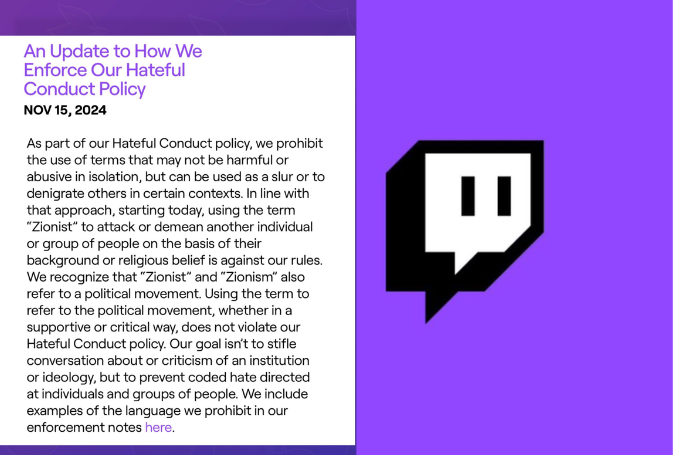
By Omar Zahzah
The connections are being drawn for us, and the increasing accommodation of Zionism in public spaces must continue to be the subject of massive, ongoing opposition.
On Friday, November 15, the gamer streaming platform Twitch updated its “Hateful Conduct policy” to prohibit criticism of “Zionists” and “Zionism.”
“As part of our Hateful Conduct policy, we prohibit the use of terms that may not be harmful or abusive in isolation, but can be used as a slur or to denigrate others in certain contexts,” Twitch wrote in the blog post announcing the change.
“In line with that approach, starting today, using the term ‘Zionist’ to attack or demean another individual or group of people on the basis of their background or religious belief is against our rules. We recognize that ‘Zionist’ and ‘Zionism’ also refer to a political movement. Using the term to refer to the political movement, whether in a supportive or critical way, does not violate our Hateful Conduct policy. Our goal isn’t to stifle conversation about or criticism of an institution or ideology, but to prevent coded hate directed at individuals and groups of people.”
Twitch further illuminates the tenuous distinction it’s attempting to strike in its Community Guidelines:
We prohibit the use of terms that may not be harmful or abusive in isolation, but can be used as a slur or to denigrate others in certain contexts. Similar to other terms that may be used as a proxy for a protected group, we treat “Zionists” as a proxy for Jews or Israelis if the word is used in a context to promote harm or violence, or when used to make dehumanizing comparisons or perpetuate antisemitic stereotypes. Comments regarding Zionism that are about the political movement, including criticisms, do not violate our Hateful Conduct Policy. Comments that call for violence against Zionism as a political movement, or comments that would otherwise violate our policies, are not allowed.
Prohibited example: Zionist [name of animal].
Allowed example: Zionist settlers keep encroaching Palestinian borders.
It would be pointless to attempt to enumerate, in painstaking detail, how problematic and even nonsensical these “guidelines” are (what does it mean to call for “violence” to a “political movement?”) Pointless, because the nonsensicality is precisely the point.
Through their vagueness, these guidelines signal to users that criticism of a settler-colonial, ethno-supremacist and genocidal project and ideology is a fraught affair that the company will proactively police.
The (not so) subtle takeaway?
Best to avoid supporting Palestine and opposing Israeli genocide on our platform.
The updated policy purports to respect the difference between political critiques and individual attacks while effectively foreclosing it.
The weaponization of identity vis-à-vis the false conflation of Zionism and Jewish identity is the preeminent tactic that apologists for Israeli settler-colonialism and genocide use to inhibit if not outright criminalize principled organizing, activism and advocacy for Palestinian rights, freedom, and liberation.
For pro-genocide forces, all denouncements of Zionism for the racist, settler-colonial ideology and movement that it represents constitute de facto antisemitism. Enshrining the possibility of slippage between advocacy for a liberation struggle and bigotry as so pronounced it warrants external corporate policing further normalizes the fictitious equivalence between anti-Zionism and antisemitism.
Following on the heels of social media juggernaut Meta’s own Policy Forum Update regarding the use of “Zionist” as a potential “proxy,” Twitch’s actions reflect an alarming, growing trend of tech platforms willingly prohibiting anti-Zionism—and, ultimately, Palestine—from their digital spaces.
It’s not just the gesture alone: while not identical, the wording of Twitch’s updated policy hews closely to Meta’s, from the talking point of Zionist as “proxy” to the prohibition of comparison to animals (which Meta categorizes under “dehumanizing comparisons.”)
Some time ago, I wrote of Meta’s Policy Forum Update regarding anti-Zionist language as a tool of digital/settler-colonialism, a term I coined to capture the convergence between Big Tech hegemony and the Zionist settler-colonial project.
Twitch’s move shows how it is not merely asymmetrical content moderation that facilitates the digital elimination of Palestine from major tech platforms: as a growing number of corporate platforms enshrine the elimination of anti-colonial politics as a guiding principle for engagement, conduct policies, so-called “community standards,” or even more official “Terms of Service” are emerging as weapons of colonial erasure in their own right.
In ‘Custodians of the Internet: Platforms, Content Moderation, and the Hidden Decisions That Shape Social Media’, Tarleton Gillespie argues that even as they strive to keep the process as opaque as possible, all platforms are defined by moderation: “Moderation is not an ancillary aspect of what platforms do. It is essential, constitutional, definitional. Not only can platforms not survive without moderation, they are not platforms without it” (21, emphasis mine.)
The mere fact of moderation is a prerequisite to a platform being a platform. And the way a platform moderates in turn defines its particular character. The public-facing guidelines under which platforms justify their moderation are therefore more than a series of ground rules, or an evasion of liability—they are, as Gillespie explains,
discursive performances… The primary purpose of the community guidelines is not arbitration. Instead, they constitute a gesture: to users, that the platform will honor and protect online speech and at the same time shield them from offense and abuse; to advertisers, that the platform is an environment friendly to their commercial appeals; and to lawmakers, to assure them of the platform’s diligence, such that no further regulation is necessary. They articulate the “ethos” of the site. (47)
This is the crux of the issue.
It is not simply that Twitch, as Meta before it, is patently laying the groundwork for further erasure of Palestine on its platform. It is that, in a time of genocide, the company has engaged in a communicative performance that establishes Zionism as integral to its company ethos.
This move no doubt signals to pro-genocide users, sponsors, and politicians with varying material and ideological investments in Palestinian death that they have little to fear in the way of intentionally platformed opposition, as it also signals to Palestinians that yet more digital terrain has been proudly ceded to the settler-colonial project and ideology predicated upon their erasure and elimination.
This policy change not only presages repression—it emerges from it.
In October, Twitch banned a group of predominantly Arab streamers for one month after they hosted a TwitchCon dedicated to Arabic terms of endearment that also featured criticism of the boycott target Sabra hummus.
The bans followed outcry from Zionist Twitch users and the ADL. Kotaku reporter Alyssa Mercante described facing a wave of backlash following reporting on the ban, and speculated that mass reporting was being intentionally used to target pro-Palestine Twitch channels.
The New Arab reports that the ADL and Congressman Ritchie Torres pushed for the policy change and have aggressively vilified Twitch due to its platforming of pro-Palestine commentator Hasan Piker.
Why would Twitch capitulate so readily?
Twitch may not be “giving in” so much as coming clean. It’s important to recall that Twitch was purchased by Amazon in 2014. Google, which was also attempting to buy the company, lost out on that opportunity, but both Google and Amazon have subsequently partnered on Project Nimbus, helping the Zionist state technologically streamline its current genocide.
Given that Palestinian death and destruction seems a worthy investment for its parent company, it’s not exactly surprising that Twitch would move to further censor Palestine-focused expression.
Aggressively banning users for invoking a pro-Palestine boycott and updating its “hateful conduct” policy could be ways for the company to save itself the bureaucratic headache of dealing with the aggressive outrage machine of anti-Palestinian racists and more effectively reflecting its true material interests on the ideological front.
Of course, digital platforms are not exempt from but are consequential actors in the broader fabric of socio-political concerns. To return to Gillespie,
How platforms are designed and governed not only makes possible social activity, it calls it into being, gives it shape, and affirms its basic legitimacy as a public contribution. Platforms don’t just mediate public discourse, they constitute it… They are designed so as to invite and shape our participation towards particular ends. (21)
Moderation is a mechanism by which platforms enforce and express their corporate vision of social propriety and accountability.
The content and structure decisions of platforms in turn bear on users’ senses of normativity and taboo when it comes to social engagement. Even if their decisions are unjust, platforms’ rulings on what content to prohibit interact with and even ultimately influence the broader contours of social hegemony.
Repression of Palestine is increasing, and its logic and mechanisms are standardizing across multiple fronts.
To that end, we can’t dissociate this growing trend of corporations prohibiting anti-Zionist speech by equating it with antisemitism from a related trend: that of universities, which, as Neil Smith reminds us, are themselves “multibillion-dollar, multinational corporations with major interests in the global equity markets and in local real estate development [read: gentrification] which also happen to give out degrees every May” (Uneven Development 264) justifying outlandish, often preemptive repression of faculty who address Palestine in their activism and/or research under misuse of Title VI of the Civil Rights Act.
Weaponizing legal statutes intended to oppose structural discrimination for the purposes of inoculating Israel and its settler-colonial, genocidal ideology from intellectual and political criticisms is proving an effective strategy for Zionists.
Reflexively risk-averse and bureaucratic to a degree that could very well outpace Kafka’s feverish imaginings, universities across the country have shown themselves eager to proactive suspend and even fire faculty out of an increasingly normalized misapplication of anti-discriminatory policy, often couched under the broader framework of Diversity, Equity and Inclusion (DEI.)
Here, Steven Salaita emerges as a prescient critical voice.
In 2011’s Israel’s Dead Soul, Salaita argued that the inherent violence of liberal multiculturalism could be reflected in its ability to subtend Zionism. This observation is in no way muted by DEI having largely eclipsed multiculturalism as the operative jargon for politically vacuous institutional virtue-signaling.
The specific terms may have changed, but the playbook is largely the same: liberal notions of “identity” and “difference” are mobilized in such a way as to hide asymmetries of power and punish righteous opposition to colonialism and genocide under the milquetoast banner of “difference.”
“Difference” in turn becomes the ruling episteme for corporate and pseudo-intellectual efficiency in its ability to invalidate the imperative for resistance and the conditions of possibility for its epistemological and symbolic fortification and expression.
There is little conceptual distinction between the misapplied Civil Rights statutes being used to punish outspoken faculty and the increasingly uniform anti-anti-Zionist policies cropping up in the guidelines of Big Tech platforms.
The connections are being drawn for us, and the increasing accommodation of Zionism in public spaces must continue to be the subject of massive, ongoing opposition.
From Twitch to American higher education, outsized corporations and corporatized universities are leaning on the same vapid liberal frameworks and buzzwords to penalize opposition to colonialism and genocide.

– Omar Zahzah is a writer, poet, organizer, and Assistant Professor of Arab and Muslim Ethnicities and Diasporas (AMED) Studies at San Francisco State University. Omar’s book, Terms of Servitude: Zionism, Silicon Valley, and Digital/Settler-Colonialism in the Palestinian Liberation Struggle is forthcoming from The Censored Press in Fall 2025. He contributed this article to The Palestine Chronicle.








Interesting you mentioning Kafka – his novel The Trial could so very easily be about Palestinians trying to get their voice heard. Though come to think of it, The Castle would fit equally as well. But anyway, we’re back in The Animal Farm, where All Animals Are Equal, But Some Are More Equal Than Others.